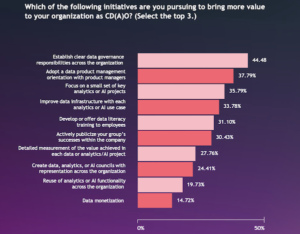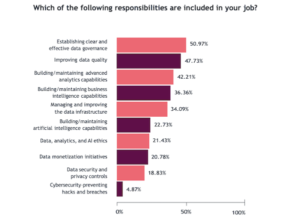AWS has released a collaborative research report on the role of the contemporary Chief Data Officer that reflects on how the position and its priorities have evolved. “CDO Agenda 2023: Prioritizing Business Value Creation,” explores how CDOs are at a crossroads between focusing on improving data infrastructure and governance or delivering business value through analytics and AI.
Together with analytics expert Tom Davenport and MIT Chief Data Officer and Information Quality Symposium (CDOIQ), AWS began research on the role of CDOs earlier this year regarding what makes them successful, what keeps them up at night, and, ultimately, what they perceive their long-term value to be, according to AWS enterprise strategist and evangelist Phil Le-Brun.
Key findings of the report include how 50% of CDOs serving today are first time CDOs, and there are challenges associated with this relatively new role. The exact parameters of the job are in question for some, with 19% of respondents reporting having an unclear job definition and 16% revealing their job definition is overly broad. Additionally, 62% of respondents stated they feel the CDO role is less understood than other C-level roles. This hazy aura surrounding the job may have something to do with evolving expectations of what CDOs are meant to accomplish.
To start with, the report reveals that data governance is the highest priority for CDOs, with 45% responding that “establishing clear and effective data governance” is their top responsibility. Data governance initiatives were the second highest task the CDOs listed as occupying at least 20% of their time. “In our view, data governance initiatives require a more strategic focus across the organization, as governance is a shared responsibility and a difficult way to add value as a CDO. Governance involves changing the behavior of data users and getting business functions and units to take more responsibility for data management,” stated the report.
As evidence for this more strategic focus, some CDOs are emphasizing “governance by design” and improving the ease of data consumption rather than the typical exhortation approaches to change user behavior, says AWS. The report revealed that most of a CDOs time is spent on data-driven culture initiatives and changing behavior around data, according to 69% of the responding CDOs. Organizational behavior and attitudes were cited as a problem by 62%, and 55% say the lack of a data-driven culture is a challenge in meeting business objectives.
Perhaps somewhat surprisingly, CDOs are not spending as much time on fraud prevention, data breaches, or other security measures. Only 18.5% reported spending at least 20% of their time on cybersecurity issues. Instead of focusing on “defensive” activities like data security, prevention, and compliance, many are finding themselves on the offense: AWS says CDOs are increasingly taking on a “data offense” strategy in order to quickly demonstrate business value. This strategy includes increasing revenues and profits through enhanced operations, improving customer relationships and marketing, and enabling new products and business processes.
This offensive approach is not as surprising if one considers how the role has evolved. The role is newer in the C-suite, as Capital One is said to have invented it in 2002. In the early days, risk management was a focus for CDOs as they were responsible for security, privacy, and accuracy of the data. However, as Datanami’s Alex Woodie has reported, as more firms have added CDOs and the tech landscape has progressed, CDOs are increasingly using advanced analytics and AI techniques for offensive purposes to prove the value of data to stakeholders.
Whether on the defensive or offensive, CDOs seem to measure their own success based on getting more done with the data. AWS says the survey and interview responses show that CDOs are primarily focused on business objectives rather than purely technical aspects. Only 2% define their success as based on preventing data problems, but 42% define their success in terms of business objectives achieved. Even those CDOs with primarily technical backgrounds are about seven times more likely to define their success in terms of business or organizational objectives achieved than in terms of technical objectives achieved, the report stated.
The crossroads between governance and business value seem to be converging and are perhaps more parallel than crossed. The report concludes with the idea that a hybrid approach of focusing on business value through analytics and AI projects while increasing data infrastructure and governance through the context of those projects is likely to persist, “There is simply too much data to be managed and consumed, and organizational data is becoming too valuable a business asset for a senior executive not to be in charge of data and how it is applied to business problems and opportunities,” the report said.
For the research, Tom Davenport, author of books such as “Competing on Analytics” and “The AI Advantage,” surveyed over 350 data executives in CDO and similar roles and directly interviewed 25. Download and read the report at this link.
Related Items:
CDOs Must Shift to Offense, Survey Finds
The post AWS Report Explores the Priorities of Today’s CDO appeared first on Datanami.





0 Commentaires